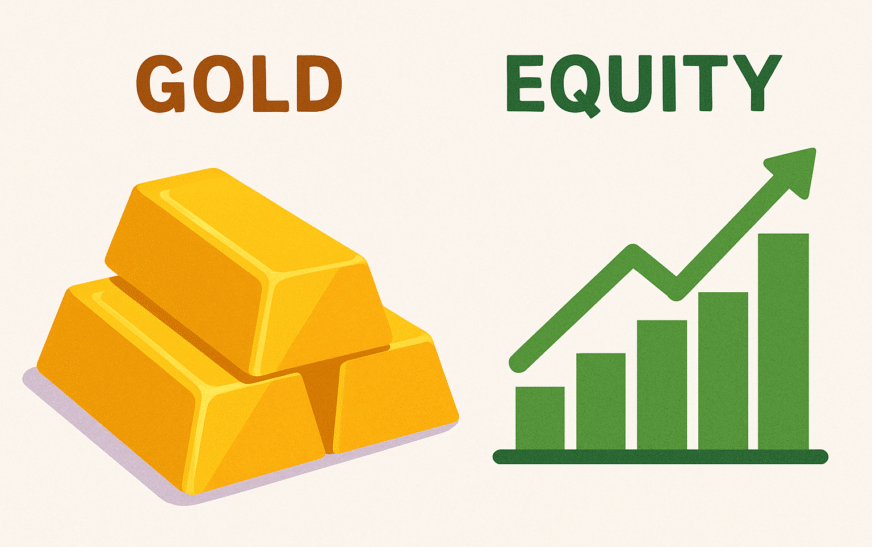Investors often ask: “Which is better, gold or equity?” The debate between Gold vs Equity as investment options has raged for decades. But data tells a very interesting story, especially if you look at performance from 2000 onward.
This comprehensive guide breaks down the historical returns, risk factors, pros and cons, and strategic considerations, helping you choose the right fit for your portfolio.
Section 1: Historical Performance Since 2000
Let’s start with the numbers.
Gold Returns (2000-2024)
Gold has seen strong periods of appreciation, especially during crises:
-
2000-2011: Massive bull run, from ~$270/oz to ~$1900/oz (~600% gain)
-
2011-2015: Correction phase, ~$1900/oz to ~$1050/oz
-
2015-2024: Recovery and new highs (~$2000–$2400/oz in 2024)
Annualised return since 2000: ~8–9% CAGR (depending on exact buy/sell date).
👉 Gold’s strength: Protection during uncertainty (2008 crisis, pandemic, inflation).
Equity Market Returns (2000-2024)
Equities (e.g., S&P 500, Nifty 50) have delivered higher average returns but with more volatility.
-
2000–2002: Dot-com crash (US markets fell ~40%)
-
2003–2007: Strong rally
-
2008: Global Financial Crisis (~50% crash)
-
2009–2019: Long bull market (~300%+ total return)
-
2020–2021: Pandemic crash and sharp rebound
-
2022–2023: Inflation fears, rate hikes, corrections
-
2024: Stabilisation and renewed growth in AI-led sectors
Annualised return since 2000: ~9–11% CAGR (depending on index and currency).
👉 Equity’s strength: Long-term wealth creation, compounding, dividend yield.
Gold vs Equity (2000–2024) at a Glance
| Metric | Gold | Equity (US/Nifty) |
|---|---|---|
| CAGR (approx) | 8–9% | 9–11% |
| Best years | 2008, 2011, 2020 | 2003–2007, 2009–2019, 2024* |
| Worst years | 2013–2015 | 2000–2002, 2008, 2022 |
| Volatility | Moderate | Higher |
| Inflation hedge | Strong | Good (companies adjust) |
| Liquidity | High | High |
*2024 data provisional based on latest trends.
KEY TAKEAWAY: Comparing gold and equity over 20+ years reveals that both assets performed well, albeit with distinct cycles. Equity often beats gold over long periods, but gold shines during crises.
Section 2: Why the Performance Differs
Nature of the Asset
-
Gold is a commodity, driven by scarcity, inflation fears, and safe-haven demand.
-
Equity represents ownership in companies that generate profits.
Economic Cycles
-
Equities suffer in recessions but recover strongly with growth.
-
Gold rises when people fear inflation, crises, or currency weakness.
Policy Impact
-
Low interest rates favour equities.
-
High inflation or rate uncertainty can boost gold.
Gold vs Equity decisions must factor in these differences.
Section 3: Risk and Diversification
Equity Risks
-
Market crashes (e.g. 2008) can halve your portfolio.
-
Company risk, sector risk, geopolitical shocks.
Gold Risks
-
No yield or dividends.
-
Price can stagnate or fall during stable periods.
Portfolio Strategy
👉 Diversification reduces risk. Many advisors suggest a 5–15% allocation to gold for balance.
✅ Example Portfolio Split:
-
60% Equity
-
30% Bonds
-
10% Gold
Gold vs Equity synergy improves stability and returns over time.
Section 4: What the Data Says About Timing
Key Patterns (2000–2024):
-
Equity crashes → Gold spikes.
-
Economic booms → Equities outperform.
-
Mixed periods → Balanced portfolios win.
Example:
-
2008: Equities crashed, gold soared.
-
2009–2019: Equities outperformed gold.
-
2020: Pandemic panic boosted gold.
-
2024: AI boom and stable rates helping equities regain the lead.
Smart investors use these cycles to rebalance, buying more of whichever asset is undervalued.
Section 5: Expert Advice for 2025 and Beyond
1️⃣ Diversify. Don’t bet everything on gold or equity.
2️⃣ Review your goals and risk tolerance.
3️⃣ Use data: History shows both assets perform over time, but differently.
4️⃣ . Rebalance annually to capture opportunities.
Gold vs Equity isn’t a “winner takes all” game—it’s about smart allocation.
Conclusion: Which Is Better?
There’s no single answer to Gold vs Equity. Historical data since 2000 shows:
-
Both delivered ~8–11% annualised returns.
-
Equities excel over the long term but crash harder.
-
Gold protects against crises and inflation.
The winning strategy? Combine them intelligently in your portfolio.
Final Note
If you’re planning your investments for the next decade, remember:
“Don’t choose between Gold vs Equity. Choose how much of each.”
Gold vs Equity is not an all-or-nothing debate. Both asset classes have proven their worth over more than two decades of data, economic cycles, and unexpected crises.
When you invest only in equities, you expose yourself to sudden market downturns that can shake even the most disciplined investor’s confidence. On the other hand, if you only rely on gold, you may miss out on the wealth creation and compounding power of high-quality companies.
A balanced approach is your best ally.
Here are a few tips to put this into action:
-
Rebalance annually: Review your portfolio once a year to ensure your gold and equity allocations remain aligned with your goals.
-
Understand your time horizon: If you’re investing for the next 15–20 years, equities can be your growth engine, while gold can act as an insurance policy.
-
Stay informed: Keep an eye on global trends, interest rates, inflation data, and currency movements. These factors often impact both gold and equity performance.
-
Avoid emotional decisions: Many investors panic during corrections. Use those moments to rebalance rather than sell in fear.
-
Work with a trusted advisor: If you’re unsure, consult a financial professional who can help tailor an allocation plan suitable for your unique needs.
Ultimately, the question isn’t which one is better forever, but rather which combination of gold and equity is best for you, right now. The data since 2000 makes it clear: investors who diversified and stayed disciplined have consistently built wealth over time, no matter how uncertain the world seemed.












